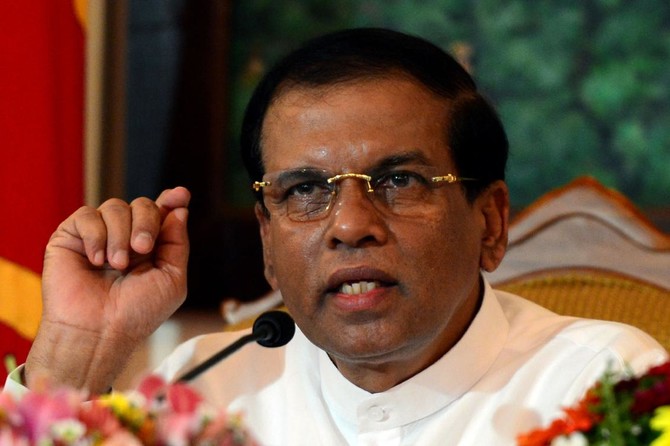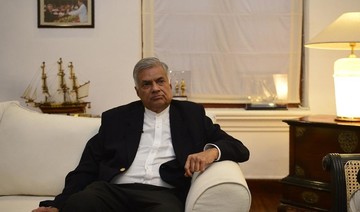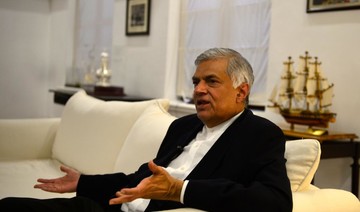COLOMBO: Sri Lanka’s president issued an order Sunday for Parliament to reconvene on Nov. 14, when lawmakers will get the chance to hold a confidence vote on the nation’s former strongman who has been named prime minister.
The announcement made in a decree comes amid a political crisis in the South Asian island nation sparked when President Maithripala Sirisena dismissed Prime Minister Ranil Wickremesinghe and his Cabinet and replaced him with Mahinda Rajapaksa last month.
Sirisena suspended Parliament in an apparent attempt to give Rajapaksa time to muster support to survive any no-confidence vote.
Political opponents, rights groups and foreign governments including the United States and European Union have urged Sirisena to summon Parliament immediately and end the crisis. Thousands of Sri Lankans also protested in the capital in the past week demanding Sirisena immediately convene Parliament.
Sirisena’s moves have triggered a power struggle that some observers have called a constitutional crisis.
Since his ouster, Wickremesinghe has remained at Temple Trees, the official residence of the prime minister — insisting he is still the legitimate leader because he commands majority support in Parliament.
Wickremesinghe said in an interview with The Associated Press that there is credible evidence that Rajapaksa’s party is attempting to buy support in Parliament. Palitha Range Bandara, a United National Party lawmaker, has said that he was offered millions of dollars and a minister portfolio if he crossed over.
Lawmakers from Rajapaksa’s party have denied the allegations.
However, seven members from Wickremesinghe’s United National Front have defected to Rajapaksa’s government.
On Saturday, the Tamil National Alliance — an ethnic minority Tamil party— said that it will support a no-confidence motion to be brought against Rajapaksa, after one lawmaker from their party joined Rajapaksa’s government.
The Tamil party’s 15 votes could give Wickremesinghe’s camp a decisive edge over Rajapaksa.
Some 120 lawmakers were expected by Sunday to support a no-confidence vote against Rajapaksa, according to AP count.
After sacking Wickremesinghe, Sirisena announced that he made the replacement in part because Wickremesinghe and a Cabinet colleague were behind an alleged assassination plot against him.
Details of the alleged plot have not been disclosed and Wickremesinghe has repeatedly denied the accusation.
Tensions had been building between Sirisena and Wickremesinghe for some time, as the president did not approve of economic reforms introduced by the prime minister.
Sirisena was also critical of investigations into military personnel accused of human rights violations during Sri Lanka’s long civil war, which ended in 2009.
Rajapaksa is credited as a hero by Sri Lanka’s ethnic Sinhalese majority for ending the conflict.
Sri Lanka president summons Parliament amid political crisis
Sri Lanka president summons Parliament amid political crisis

- Sri Lanka's president has ordered the suspended parliament to reconvene on Nov. 14
- This clears the way for a vote on his decision to sack the elected prime minister and replace him with wartime nationalist Rajapaksa
India and US to address barriers to trade and cooperation

The commitment was made at a meeting between the national security advisers of the two countries, Ajit Doval and Jake Sullivan, during Sullivan’s two-day visit to New Delhi.
The US and India are forging deeper strategic ties, with mutual concerns about an ascendant China in the Indo-Pacific region, even though India has maintained its close relationship with Russia despite its invasion of Ukraine in 2022.
Sullivan and his Indian counterpart chaired the second meeting of the India-US initiative on Critical and Emerging Technology, which they launched in January 2023.
Without naming any country, a joint fact sheet of the meeting shared by the Indian government said Sullivan and Doval “resolved to prevent the leakage of sensitive and dual-use technologies to countries of concern.”
They also launched a new strategic semiconductor partnership between US and Indian companies for precision-guided ammunition and other national security-focused electronics platforms, it said.
They also agreed to co-invest in a lithium resource project in South America and a rare earths deposit in Africa “to diversify critical mineral supply chain” and committed to soon conclude a bilateral critical minerals pact for graphite, gallium and germanium.
Last year, during Modi’s state visit to Washington, India had announced buying 31 MQ-9B drones from General Atomic, and the two countries had started discussions to jointly produce General Electric’s fighter jet engines by Hindustan Aeronautics in India, which is yet to be finalized.
Sullivan and Doval also discussed possible co-production of land warfare systems.
The visit is the first by a high-ranking US official since Prime Minister Narendra Modi returned to office with the help of allies as his party failed to win a majority.
Modi met US President Joe Biden on the sidelines of the G7 Summit in Italy last week. Sullivan met Modi and Foreign Minister Subrahmanyam Jaishankar earlier in the day.
The relationship between Washington and New Delhi has been tested after the US accused Indian government agents of plotting to murder a Sikh separatist leader on US soil last year, after Canada made similar allegations. India dismissed the Canadian accusations, but initiated an investigation into the US allegations.
The US has extradited an Indian national from the Czech Republic, whom it has indicted for the foiled assassination plot.
There have also been some concerns raised about the treatment of minorities in India.
German rescue team finds 10 bodies of suspected migrants off Italy's Lampedusa island

- The other search and rescue operation off the Calabrian coast started following a Mayday call by a French boat
ROME: Rescue workers found 10 bodies of suspected migrants below the deck of a wooden boat off Italy’s tiny Lampedusa island on Monday, the German aid group Resqship said, as the Italian coast guard searched for missing people from another vessel shipwrecked off the country's southern coast.
The crew aboard Resqship’s boat, the Nadir, “is currently caring for 51 people. The rescue came too late for 10 people,” the group said in a post on X, formerly Twitter.
“A total of 61 people were on the wooden boat, which was full of water. Our crew was able to evacuate 51 people, two of whom were unconscious – they had to be cut free with an axe,” it added. “The 10 dead are in the flooded lower deck of the boat.”
The other search and rescue operation off the Calabrian coast started following a Mayday call by a French boat, sailing about 120 miles (193.12 kilometers) from Italian shores, at the limit of the SAR areas under the jurisdiction of Greece and Italy, the Italian Coast Guard said in a statement.
After reporting the presence of the half-sunken boat, rescuers recovered 12 migrants from the vessel. The survivors were brought to the Calabrian port of Roccella Jonica, where they were disembarked and entrusted to the care of medical personnel.
One of the migrants died soon after, the coast guard said. It was not immediately clear the number of missing people from that boat.
The Italian Maritime Rescue Coordination Center (IMRCC) of the coast guard in Rome immediately diverted two merchant vessels sailing nearby to the scene of the rescue. Assets from the European Border and Coast Guard Agency Frontex also helped.
Putin extends defense ministry purge, hands job to a relative

- More than two years into the war in Ukraine, Putin has used the changes to signal that he wants to clear out wastage and corruption
MOSCOW: Russian President Vladimir Putin sacked four deputy defense ministers on Monday and appointed a relative to fill one of the resulting vacancies.
The reshuffle marked the latest stage in a radical shakeout which Putin launched in May when he unexpectedly removed his longstanding defense minister Sergei Shoigu.
More than two years into the war in Ukraine, Putin has used the changes to signal that he wants to clear out wastage and corruption in the ministry and harness Russia’s war economy more effectively to serve the needs of soldiers at the front.
In the latest changes, Putin sacked deputy defense ministers Nikolai Pankov, Ruslan Tsalikov, Tatiana Shevtsova and Pavel Popov, according to Kremlin decrees.
He appointed Anna Tsivileva, the daughter of his late cousin, as a deputy defense minister whose responsibilities will include improving social and housing support for military personnel. Her husband Sergei Tsivilev is Russia’s energy minister.
Putin had previously appointed Tsivileva as head of a state fund to support participants of Russia’s war effort in Ukraine.
Leonid Gornin, previously first deputy finance minister, will now serve as first deputy defense minister under Defense Minister Andrei Belousov, an economist with no military experience who was named last month to replace Shoigu.
Gornin’s main tasks are “to increase the transparency of financial flows and ensure efficient spending of budget funds,” the defense ministry said.
Also named as deputy defense ministers were Oleg Savelyev and Pavel Fradkov, the son of former Prime Minister Mikhail Fradkov. Fradkov will oversee the management of property, land and construction relating to the military.
Another former deputy defense minister, Timur Ivanov, was arrested on April 23 and accused of bribe-taking. Since then, four other top officials at the ministry and general staff have been arrested on the same charges in the biggest corruption scandal to hit the Russian government in years.
Low snow on the Himalayas threatens water security — study

- While snow levels fluctuate each year, scientists say climate change is driving erratic rainfall and shifting weather patterns
- Snow and ice crucial water source for around 240 million people in mountainous regions, 1.65 billion people in the river valleys below
KATMANDU: Millions of people dependent on Himalayan snowmelt for water face a “very serious” risk of shortages this year after one of the lowest rates of snowfall, scientists warned Monday.
Snowmelt is the source of about a quarter of the total water flow of 12 major river basins that originate high in the region, the report said.
“This is a wake-up call for researchers, policymakers, and downstream communities,” said report author Sher Muhammad, from the Nepal-based International Center for Integrated Mountain Development (ICIMOD).
“Lower accumulation of snow and fluctuating levels of snow pose a very serious increased risk of water shortages, particularly this year.”
Snow and ice on the Himalayas are a crucial water source for around 240 million people in the mountainous regions, as well as for another 1.65 billion people in the river valleys below, according to ICIMOD.
While snow levels fluctuate each year, scientists say climate change is driving erratic rainfall and shifting weather patterns.
The report measured “snow persistence” — the time snow remains on the ground — with levels dropping almost a fifth below normal this year across the wider Hindu Kush and Himalaya region.
“This year’s snow persistence (18.5 percent below normal) is the second-lowest in the past 22 years, narrowly trailing the record low of 19 percent set in 2018,” Muhammad told AFP.
As well as Nepal, the inter-governmental ICIMOD organization includes member countries Afghanistan, Bangladesh, Bhutan, China, India, Myanmar and Pakistan.
The report warned that ICIMOD “observations and projections indicate significant changes in the timing and intensity of stream flows,” with snow a key part.
“Snow plays a particularly important role in ensuring seasonal water availability,” it added.
The organization has been monitoring snow in the region for over two decades, noting that 2024 marked a “significant anomaly.”
The Ganges river basin, which flows through India, had the “lowest snow persistence” that ICIMOD has recorded, 17 percent below average, worse than the 15 percent in 2018.
The Helmand river basin in Afghanistan recorded its second-lowest snow persistence levels, 32 percent below normal.
The Indus river basin was down 23 percent below normal levels, while the Brahmaputra river basin, which ends in Bangladesh, had snow persistence “notably below normal” at 15 percent.
Miriam Jackson, senior cryosphere specialist at ICIMOD, urged authorities to “take proactive measures to address possible drought situations.”
Indian suspect in plot to kill Sikh separatist extradited to US

- Man accused over murder-for-hire plot extradited from Czech Republic
- Alleged plot targeted Sikh separatist resident in US, India denies involvement
WASHINGTON/PRAGUE: An Indian man suspected by the US of involvement in an unsuccessful plot to kill a Sikh separatist on American soil has been extradited to the United States from the Czech Republic, the Czech justice minister said on Monday.
Nikhil Gupta has been accused by US federal prosecutors of plotting with an Indian government official to kill Gurpatwant Singh Pannun, a US. resident who advocated for a sovereign Sikh state in northern India.
Gupta traveled to Prague from India last June and was arrested by Czech authorities. Last month, a Czech court rejected his petition to avoid being sent to the US, clearing the way for the Czech justice minister to extradite him.
“On the basis of my decision on (June 3), the Indian citizen Nikhil Gupta, who is suspected of conspiracy to commit murder-for-hire with intent to cause death, was extradited to the US on Friday (June 14) for criminal prosecution,” Czech Justice Minister Pavel Blazek said on social media platform X.
The comments confirmed an earlier Reuters story reporting on the extradition that cited the federal Bureau of Prisons website and a source familiar with the matter.
An inmate search by name on the Bureau of Prisons website showed on Sunday that Gupta, 52, was being held at the Metropolitan Detention Center, Brooklyn, a federal administrative detention facility.
A US Justice Department spokesperson declined to comment. Gupta’s US-based lawyer, attorney Jeffrey Chabrowe, had no immediate comment.
Over a dozen people were killed and tens injured after a freight train smashed into the back of a stationary passenger train in India’s West Bengal state on Monday,
DIPLOMATIC RELATIONS TESTED
The discovery of alleged assassination plots against Sikh separatists in the US and Canada has tested relations with India, seen by Western nations as a counter to China’s rising global influence. India’s government denies involvement in such plots.
Canada said in September its intelligence agencies were pursuing allegations linking India’s government to the murder of Sikh separatist leader Hardeep Singh Nijjar in June 2023 in Canada.
In November, US authorities said an Indian government official had directed the plot in the attempted murder of Pannun, who is a US and Canadian citizen. Gupta is accused of involvement in that plot.
Pannun told Reuters on Sunday that while the extradition was a welcome step, “Nikhil Gupta is just a foot soldier.” He alleged that those who hired Gupta were senior members of the Indian government who act on the direction of Prime Minister Narendra Modi.
India’s government has dissociated itself from the plot against Pannun, saying it was against government policy. It has said it would formally investigate security concerns raised by Washington.
New Delhi has long complained about Sikh separatist groups outside India, viewing them as security threats. The groups have kept alive the movement for Khalistan, or the demand for an independent Sikh state to be carved out of India.
Last month, Washington said it was satisfied so far with India’s moves to ensure accountability in the alleged plots, but added that many steps still needed to be taken.















